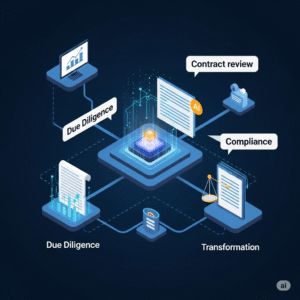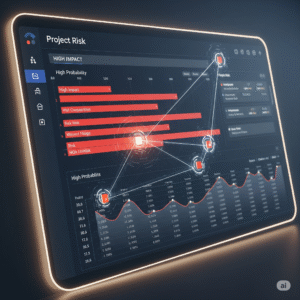We stand at the dawn of an incredible new era. Generative AI can write poetry, compose music, and analyze data in seconds. It truly feels like magic. However, behind every brilliant AI response lies a hidden vulnerability. This includes the potential for bias and unethical outcomes that can silently poison your brand’s reputation. Fortunately, the architect standing between this power and potential chaos is a new, critical role: the AI Prompt Engineer.
This isn’t just another tech buzzword. In fact, the AI Prompt Engineer is rapidly becoming the most vital role for a safe and profitable AI-driven future. They act as guardians of the AI’s “mind.” Specifically, they are translators who don’t just ask questions. Instead, they meticulously shape the AI’s behavior, values, and ethics. In this deep dive, we’ll explore why this role is essential for AI ethics in prompt design. Furthermore, we will see how an AI Prompt Engineer already creates immense value for businesses.
What is an AI Prompt Engineer (And Why Should You Care)?
At its core, an AI Prompt Engineer is a specialist. They design, refine, and optimize the instructions, or prompts, that we give to AI models like GPT-4. Think of them as a mix of a psychologist, a linguist, and a programmer, not just someone typing questions. Because of this unique blend of skills, they understand the nuances of language and the AI’s inner workings. This allows them to craft prompts that produce accurate, relevant, and ethically sound responses.
For instance, a casual user might ask, “Write a job description for a manager.” In contrast, an AI Prompt Engineer constructs a much more detailed prompt. Their prompt specifies the industry, tone, company values, and inclusive language to use. It even lists negative keywords to avoid. This precision separates a generic output from a high-quality, brand-aligned asset. Ultimately, this level of control is no longer a luxury. It’s a business necessity when a single rogue AI output can cause a PR nightmare.
The AI Prompt Engineer: Your First Line of Defense
The role of an AI Prompt Engineer goes far beyond getting better answers. Indeed, they are the first line of defense against the inherent risks of AI. Their main function is to embed ethics directly into the prompt design. This creates a crucial control layer between the AI’s raw power and the end-user. As a result, this proactive approach ensures the AI operates within ethical guardrails. It minimizes the chances of generating harmful content that could damage trust and expose your business to liability.
The Unseen Danger: AI Ethics in Prompt Design is a Ticking Time Bomb
AI models are not born with a moral compass. Instead, they learn from the vast and messy data developers use for training, much of it from the internet. This data is often biased. Therefore, without careful guidance, these models can perpetuate and even amplify societal biases. These biases often relate to gender, race, age, and culture. This is where AI ethics in prompt design becomes critically important. Poorly designed prompts don’t just yield poor results; they actively generate harmful ones.
The Ghost in the Machine: How Bias Creeps In
Bias in AI is a subtle yet pervasive threat. For example, if you ask an AI to generate images of “a successful CEO,” it will likely produce a non-diverse set of results. This happens because its training data is often skewed towards images of men. An AI Prompt Engineer combats this directly. They design prompts that explicitly challenge these biases. For instance, they might write: “Generate a series of photorealistic images depicting successful CEOs from diverse ethnic backgrounds and genders, including individuals with disabilities, leading boardroom meetings.” This simple act of ethical prompt design changes everything. It transforms the outcome from a biased reflection of the past to an inclusive vision of the future.
The AI Prompt Engineer as the Ethical Guardian
To prevent these negative outcomes, businesses need a dedicated human in the loop. This person’s focus must be on the ethical implications of every query. This is the ultimate calling of the AI Prompt Engineer. They serve as the conscience of the AI system, ensuring its application aligns with company values and societal good.
Building Guardrails: The Proactive Role of an AI Prompt Engineer
An effective AI Prompt Engineer doesn’t just fix bad outputs; they prevent them from happening in the first place. Their work involves a continuous, proactive cycle of ethical oversight. Here’s how they do it:
- Stress-Testing for Bias: First, they intentionally try to “break” the AI. They feed it prompts designed to provoke biased responses, a practice called “red teaming.” This helps them identify vulnerabilities before anyone can exploit them.
- Crafting Value-Aligned Prompts: Next, they work with stakeholders to understand the company’s ethical principles. Then, they translate these principles into concrete instructions for the AI.
- Ensuring Fairness and Representation: Also, they meticulously design prompts that promote fairness and avoid stereotypes. This ensures the AI’s output is inclusive and respectful.
- Developing Documentation: Finally, they create clear guidelines and prompt libraries for the entire organization. This helps scale ethical AI usage across the company. You can learn more about building responsible AI frameworks by reading about the principles from pioneers like OpenAI.
Case Study 1: Salesforce’s Commitment to Ethical AI
Salesforce, a giant in the CRM space, built its AI platform, Einstein, on a foundation of ethical principles. While they have entire teams dedicated to this, the functional role of an AI Prompt Engineer is central to their process. Their teams design and test prompts within Einstein to ensure AI-driven predictions are free from bias. For example, they make sure that lead-scoring prompts don’t penalize leads from specific zip codes or with certain names. This commitment to AI ethics in prompt design ensures their clients receive fair, objective insights, thereby building deep trust and driving long-term loyalty.
From Theory to Profit: How an AI Prompt Engineer Drives Business Value
Embedding ethics into your AI strategy isn’t just about doing the right thing. In reality, it’s incredibly smart business. A skilled AI Prompt Engineer directly contributes to the bottom line. They do this by mitigating risks and helping create superior products. Consequently, companies that champion ethical AI build stronger brands, attract top talent, and earn customer trust. That trust is the most valuable currency in today’s economy.
For perspective, a report by McKinsey shows that companies are increasingly aware of these risks. They see that inaccurate or biased AI outputs are a major concern. An AI Prompt Engineer is the direct solution. They manage that risk, turning a potential liability into a competitive advantage.
Case Study 2: Stitch Fix and Personalized, Unbiased Fashion
The online personal styling service Stitch Fix uses a powerful combination of data science and human stylists. Their AI algorithms analyze customer data to suggest clothing. Therefore, the success of their model hinges on providing truly personalized and inclusive recommendations. The prompts guiding their AI must be meticulously engineered to avoid style or size biases. By focusing on prompt-driven AI that respects individual preferences without making stereotypes, they foster a positive customer experience. This, in turn, leads directly to higher customer satisfaction, lower return rates, and a thriving business.
Your Toolkit for Responsible AI Prompt Design
Getting started with ethical AI doesn’t require a massive budget. In fact, several powerful tools can help you and your team begin implementing the principles of an AI Prompt Engineer.
- Generative AI Platforms (ChatGPT/Claude): Use these tools as a sandbox, not just for answers. Test different prompt structures to see how they influence the AI’s tone and bias. The interface of ChatGPT is perfect for this type of rapid iteration.
- Text Analysis Tools (MonkeyLearn): Tools like MonkeyLearn can analyze AI-generated text for sentiment and keywords. You can use this to objectively measure whether the AI’s output aligns with your intended ethical guidelines.
- Business Intelligence Dashboards (Tableau/Power BI): When using AI for data analysis, it’s wise to visualize the results. With tools like Tableau, dashboards can help you quickly spot anomalies or patterns that suggest underlying bias.
Getting Started: A Beginner’s Workflow for Ethical Prompting
You don’t need to hire a full-time AI Prompt Engineer tomorrow. You can start improving your AI ethics in prompt design right away. Simply implement this workflow to make your AI interactions more responsible today:
- Define Your Goal & Ethical Boundaries: First, before you write a single word, be clear about your goal. Know what you want to achieve and what you must avoid. What tone do you desire? What stereotypes or biases should you exclude?
- Draft Multiple Prompt Variations: Next, don’t settle for your first idea. Write 3-5 different versions of your prompt. Experiment with wording, context, and constraints.
- Test for Edge Cases and Bias: Then, actively try to find flaws. Ask yourself, “How could the AI misinterpret this prompt? What’s the worst possible output it could generate?” Afterwards, adjust your prompt to add guardrails.
- Refine and Document: After testing, select the best-performing prompt. Save it in a shared library for your team. Also, document why it works well and the ethical considerations you addressed.
- Monitor and Iterate: Finally, remember that AI models constantly evolve. Periodically review your saved prompts. This ensures they still produce the high-quality, ethical results you expect.
- AI in Customer Support is Broken. Here’s the Real Reason Why.
The Future is Prompt-Driven: Why the AI Prompt Engineer Role is Exploding
As AI becomes more integrated into every facet of business, the need for human oversight will only grow. Therefore, the role of the AI Prompt Engineer is not a temporary trend; it is the future of how we interact with and control AI. They are the essential bridge between human intent and machine execution. They are the artists and scientists who will ensure that this powerful technology serves humanity in a safe and equitable way.
Ultimately, the quality of our AI-powered future will depend on the quality of our questions. Investing in the skills of an AI Prompt Engineer is an investment in a future where AI operates not as a wild, unpredictable force, but as a trusted, ethical, and valuable partner.ates not as a wild, unpredictable force, but as a trusted, ethical, and immensely valuable partner.
AI in Healthcare Diagnostics Will See You Now
Keyword List
AI Prompt Engineer, AI ethics in prompt design, what is an AI prompt engineer, ethical AI development, bias in AI models, responsible AI design, prompt design principles, AI for business intelligence, future of prompt engineering, large language model ethics, generative AI ethics, AI business applications.



